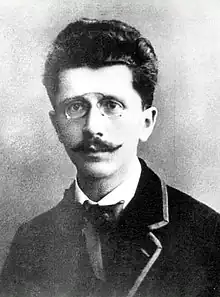Stanyslav Lyudkevych
Stanyslav Pylypovych Lyudkevych (Ukrainian: Станіслав Пилипович Людкевич; 24 January 1879 – 10 September 1979) was a Soviet and Ukrainian composer, theorist, teacher, and musical activist. People's Artist of the USSR (1969) and Hero of Socialist Labour (1979). He earned a Doctor of Philosophy in musicology in Vienna, 1908. His name may alternatively be spelled as Stanislaw Ludkiewicz (Polish) or Stanislav Filipovich Ludkevich (Russian).
Stanyslav Lyudkevych | |
|---|---|
 | |
| Background information | |
| Birth name | Stanyslav Pylypovych Lyudkevych |
| Born | 24 January 1879 Jarosław, Kingdom of Galicia and Lodomeria, Austria-Hungary |
| Died | 10 September 1979 (aged 100) Lviv, Ukrainian SSR, Soviet Union |
| Occupation(s) | Composer, theorist, and teacher |
Biography
Lyudkevych was born in 1879 in Jarosław, Austria-Hungary (now Poland). He is a former student of the Lviv Academic Gymnasium.[1] From 1898 to 1907 Lyudkevych studied philosophy in the Lviv University. Although he initially learned music theory privately from his mother who was a pianist, Lyudkevych studied with Mieczysław Sołtys in Lviv and with O. Tsemlinsky and H. Hredener in Vienna. From 1901, Lyudkevych worked as a teacher in Lviv and Przemyśl.
From 1905 to 1907, Lyudkevych was an editor of the magazine Artistic Bulletin. He was one of the organizers of the higher musical institute in Lviv named after Mykola Lysenko, in 1910—1915 he was its director, and from 1919, teacher of theoretical disciplines and inspector of legal entities. He worked with the choirs Boyan, Bandurist, Surma. In 1936, Lyudkevych became head of the musicological commission of the Shevchenko Scientific Society. In 1939-72, he was a professor in the institute named after Mykola Lysenko.
He died on September 10, 1979, in Lviv, aged 100.
Works
- Opera - Dovbush (1955)
- Monumental Cantatas including the symphony-cantatas Caucasus (1905–13) and Zapovit (Will, 1934, 2nd edition 1955) based on words by Taras Shevchenko both for which he won the Republican Prize in the name of Taras Shevchenko in 1964
- Symphonic works - symphonic poems, sinfoniettas, chamber and other instrumental pieces
- Choral works
- Romances
- Songs.
- He systematized folk songs.
He was the author of numerous musicological works, was a publicist, and originator and editor of musical publications.
Style
The participation of Lyudkevych in the revolutionary-democratic movement of Western Ukraine lead to the ideological orientation of his activities and works.
Honors
- 1946 – Honored Art Worker of the Ukrainian SSR
- 1949 – Order of the Red Banner of Labour
- 1951 – Order of the Badge of Honour
- 1954 – People's Artist of the Ukrainian SSR
- 1964 – Shevchenko National Prize for his Symphony-Canata "Caucasus" and his vocal-symphonic cantata "Zapovit" based on words by Taras Shevchenko
- 1969 – People's Artist of the USSR
- 1974 – Order of Friendship of Peoples
- 1979 – Order of Lenin
- 1979 – Hero of Socialist Labour
- Featured on a Ukrainian stamp.
- Lviv Art College is named after S. Ludkevych as well as streets in Lviv, Stryi, Pustomyty and also Jarosław (Poland), where Lyudkevych was born.[2]
See also
- List of Ukrainian composers - see other Ukrainian composers of the same period
References
- (in Ukrainian) Gymnasium principal: You can regret various canceled celebrations, but the priority of students' health is much more important, Ukrayinska Pravda (17 September 2020)
- L. Kyianovska. "У рідному місті Станіслава Людкевича з'явилася вулиця його імені - Львівська Поштa". lvivpost.net. Archived from the original on December 15, 2018. Retrieved September 13, 2021.
External links
- Lyudkevich Stanislav (1879-1979) - Piano music by Russian composers of 20th century, MIDI archive
- Information about Lyudkevych on Ukrainian Art Song Project's website
- Info about Stanyslav Lyudkevych (in Russian)